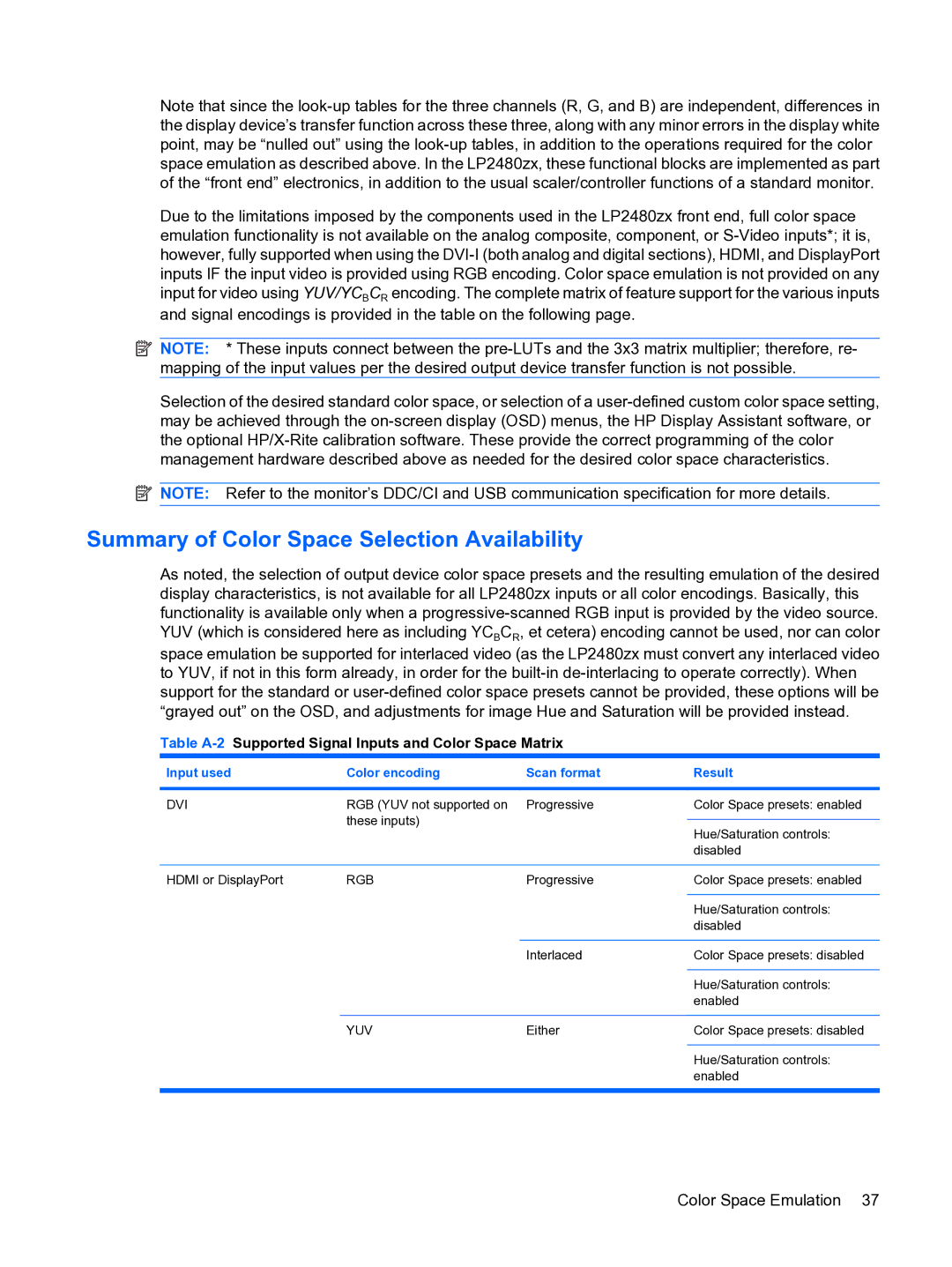Note that since the look-up tables for the three channels (R, G, and B) are independent, differences in the display device’s transfer function across these three, along with any minor errors in the display white point, may be “nulled out” using the look-up tables, in addition to the operations required for the color space emulation as described above. In the LP2480zx, these functional blocks are implemented as part of the “front end” electronics, in addition to the usual scaler/controller functions of a standard monitor.
Due to the limitations imposed by the components used in the LP2480zx front end, full color space emulation functionality is not available on the analog composite, component, or S-Video inputs*; it is, however, fully supported when using the DVI-I (both analog and digital sections), HDMI, and DisplayPort inputs IF the input video is provided using RGB encoding. Color space emulation is not provided on any input for video using YUV/YCBCR encoding. The complete matrix of feature support for the various inputs and signal encodings is provided in the table on the following page.
 NOTE: * These inputs connect between the pre-LUTs and the 3x3 matrix multiplier; therefore, re- mapping of the input values per the desired output device transfer function is not possible.
NOTE: * These inputs connect between the pre-LUTs and the 3x3 matrix multiplier; therefore, re- mapping of the input values per the desired output device transfer function is not possible.
Selection of the desired standard color space, or selection of a user-defined custom color space setting, may be achieved through the on-screen display (OSD) menus, the HP Display Assistant software, or the optional HP/X-Rite calibration software. These provide the correct programming of the color management hardware described above as needed for the desired color space characteristics.
 NOTE: Refer to the monitor’s DDC/CI and USB communication specification for more details.
NOTE: Refer to the monitor’s DDC/CI and USB communication specification for more details.
Summary of Color Space Selection Availability
As noted, the selection of output device color space presets and the resulting emulation of the desired display characteristics, is not available for all LP2480zx inputs or all color encodings. Basically, this functionality is available only when a progressive-scanned RGB input is provided by the video source. YUV (which is considered here as including YCBCR, et cetera) encoding cannot be used, nor can color
space emulation be supported for interlaced video (as the LP2480zx must convert any interlaced video to YUV, if not in this form already, in order for the built-in de-interlacing to operate correctly). When support for the standard or user-defined color space presets cannot be provided, these options will be “grayed out” on the OSD, and adjustments for image Hue and Saturation will be provided instead.
Table A-2Supported Signal Inputs and Color Space Matrix
Input used | Color encoding | Scan format | Result |
| | | |
DVI | RGB (YUV not supported on | Progressive | Color Space presets: enabled |
| these inputs) | | |
| | Hue/Saturation controls: |
| | |
| | | disabled |
| | | |
HDMI or DisplayPort | RGB | Progressive | Color Space presets: enabled |
| | | |
| | | Hue/Saturation controls: |
| | | disabled |
| | | |
| | Interlaced | Color Space presets: disabled |
| | | |
| | | Hue/Saturation controls: |
| | | enabled |
| | | |
| YUV | Either | Color Space presets: disabled |
| | | |
| | | Hue/Saturation controls: |
| | | enabled |
| | | |

![]() NOTE: * These inputs connect between the
NOTE: * These inputs connect between the ![]() NOTE: Refer to the monitor’s DDC/CI and USB communication specification for more details.
NOTE: Refer to the monitor’s DDC/CI and USB communication specification for more details.